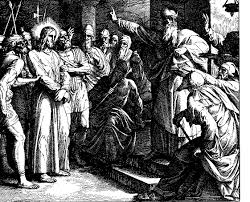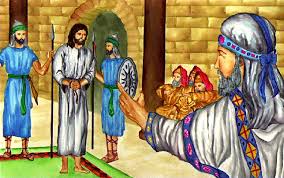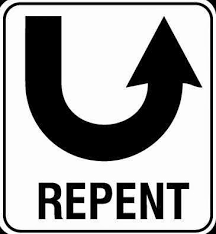Matthew 27:1-2 – When morning came, all the chief priests and the elders of the people took council against Jesus to put him to death. And they bound him and led him away and delivered him over to Pilate the governor.
In the last part of chapter 26, we saw that Jesus was taken before an illegal assembly of the Sanhedrin, where he was pronounced guilty of blasphemy and sentenced to death.
Although the chief priest and his cronies seemed to have gotten what they desired, there were a couple of problems to overcome.
First, it was illegal to meet at night to decide the sentence against a defendant. The council normally met during daylight hours, in a room at the temple, but that night they held their illegal trial at the house of the high priest, Caiaphas. To get around their unlawful actions, they quickly gathered the next morning to have an 'official' trial and sentencing. Scholars feel that they met as soon as the day broke, around 5 am.
 Second, the Romans were not going to put someone to death on a charge of blasphemy against God. They would consider it a matter of religion, and refer the case back to the Sanhedrin.
Second, the Romans were not going to put someone to death on a charge of blasphemy against God. They would consider it a matter of religion, and refer the case back to the Sanhedrin.
This was a problem for the Jews. The Law states that anyone guilty of blasphemy was to be stoned (Leviticus 24:16, John 10:33), but at that time the only stonings that took place were born out of a mob mentality – if a number of Jews heard the blasphemy they would spontaneously stone the person (Acts 7:56-60). These cases were pretty rare at the time.
Under normal circumstances, if the Jews wanted to execute anyone, they had to get the Romans to do it. This required them to prove the charges before the governor.
What charges would get the attention of the Romans?
So part of the early morning meeting of the Sanhedrin would also have included a discussion of the new charges they were going to bring against Jesus. What accusation could they submit to the governor that would cause him to take action? We will examine the charges shortly.
For now, let us take note that Jesus was judged first by the Jews, then by the Gentiles. Both played a part in his death; both would be redeemed by the same innocent blood they shed.
Matthew 27:3-4a – Then when Judas, his betrayer, saw that Jesus was condemned, he changed his mind and brought back the thirty pieces of silver to the chief priests and the elders saying, "I have sinned by betraying innocent blood."
These verses indicate that things did not turn out as Judas expected. Perhaps he thought that Jesus would work a miracle to deliver himself. Perhaps he thought that Jesus would reason or bargain with the religious leaders for his freedom. He may even have expected the charges to be dropped, as Jesus was certainly innocent. In any case, Judas definitely seems surprised that Jesus has actually been condemned.
At that point, Judas experiences the horror of a guilty conscience. He realizes that he has caused an innocent man to be sentenced to death.
Think about the implications of that for a minute – Judas has spent the last three years living and ministering with Jesus. Judas had observed Jesus in both his public life and his private life. He heard what Jesus taught publicly, and he saw how he lived by those principles privately. He was a witness to the hours Jesus spent in prayer. He saw the compassion and the love that Jesus had for sinners. There is no question that Judas had a front row seat to everything that Jesus said and did.
Don't you think that if Jesus had done anything, I mean anything evil no matter how small or insignificant, that Judas would have stated it? Because he felt guilty, Judas would have wanted to vindicate himself. He would have put forth any reason he knew of as to why Jesus was evil or guilty. If there had been even the slightest bit of evil in the life of Jesus, Judas would probably have blown it all out of proportion and made it look worse than it was, just so he could save face and assuage his conscience.
So, if there had been something evil in the life of Christ, Judas would have been the one to see it. He would have been the one to reveal it. With that knowledge, he could have been the star witness at the midnight trial. He could have escaped the horror of a guilty conscience and probably received yet another reward from the Jewish leaders. But that didn't happen. Instead, Judas fully and frankly confessed that Jesus was innocent. The testimony of Judas was far more reliable than any of the witnesses at the trial!
Matthew 27:4b - They said, "What is that to us? See to it yourself."
What is the reaction of the elders when they hear the true testimony of Judas? They throw his guilt back in his face!
The leaders of religion, the physicians of the spirit man, should have come along side this sick soul, poured out healing ointment, and bandaged his wounds. They should have schooled him in repentance, then accepted and offered up whatever offering he made for his sin. They should have led him in the paths of righteousness and assisted him in making peace with God. That was their duty as religious leaders.
But instead, they poured salt on his wounds and destroyed any inkling of repentance. Having achieved their goal (the condemnation of Christ), they have no concern for the one they used as a tool of their own wickedness.
Matthew 27:5 – And throwing down the pieces of silver into the temple, he departed, and he went and hanged himself.
Casting the pieces of silver back into the temple was evidence of Judas' remorse for his crime. His ill gotten gain now did him no good. It could not relive his agonized mind or his stinging conscience. He vainly hoped that returning the money would ease his guilt, but the guilt was attached to his soul, not the money.
We said that Judas displayed remorse for his sin. This is true. But remorse is different than repentance.
Remorse is anguish, torment or gnawing pain which is the result of guilt. It does not contain any element of seeking forgiveness or of changing one's mind and actions. It is simply a state of suffering.
Like remorse, repentance includes an element of anguish for one's actions/guilt. However, it also indicates change – a change of mind, purpose or conduct; it means to seek forgiveness; to cease the love and practice of sin.
Paul talks about the difference between remorse and repentance in his letter to the Corinthians:
2 Corinthians 7:9-10 – As it is, I rejoice, not because you were grieved, but because you were grieved into repenting. For you felt a godly grief, so that you suffered no loss through us. For godly grief produces a repentance that leads to salvation without regret, whereas worldly grief produces death.
Even though Judas experienced remorse and confessed his sin to the priests, he did not truly repent. He did not seek mercy or forgiveness from God; he was not willing to change his ways. He came to the temple steeped in sin and he left the same way. As a result, his regret produced only death. While this was his own fault, it should be noted that the priests did not help him at all.
How are we running our own 'temples'? The bible says that our bodies are the temple of God:
1 Corinthians 6:19 What? know you not that your body is the temple of the Holy Spirit who is in you, whom you have of God, and you are not your own?
It also says that all Christians are priests of God:
Revelation 1:5-6 - ...to him who loves us and has freed us from our sins by his blood and made us a kingdom, priests to his God and Father.
Therefore, all Christians have both the ability and the responsibility to lead repentant souls to Christ, where they can find life. When a sinner comes to us, we need to be able to share the love and mercy of Christ with them. We need to be able to lead them in a prayer of repentance which leads to eternal life.
Are you prepared to do that? Do you know a few key scriptures that you could use to lead someone to Christ? If not, now is a good time to get a few notes and scriptures together, so you can be prepared when the time comes.
Matthew 27:6-7 – But the chief priests, taking the pieces of silver, said, "It is not lawful to put them into the treasury, since it is blood money." So they took council and bought with them the potter's field as a burial place for strangers.
There were several small chests scattered throughout the outer courts of the temple. If people wanted to give a voluntary offering to God, or to pay the half-shekel tax owed by Jewish men, they placed their money into these chests. All money collected here was dedicated to sacred purposes. These chests were collectively referred to as the temple treasury.
Deuteronomy 23:18 infers that money unlawfully gained or money derived from an impure source could never be used in purchasing things for God's service. Because these 30 pieces of silver were actually the price of the murder of Jesus, the priests felt they could not put it back into the treasury.
So, in their eyes, it was okay to take money out of the temple treasury to pay for the murder of Jesus, but it was unlawful to return those same coins back to the treasury!
 The priests have no problem with accepting testimony from false witnesses and perverting justice in order to condemn an innocent man, but they worry about the legalities of putting a few coins into the treasury! These hypocrites have no concerns about breaking the eternal laws of justice and mercy, but they are willing to split the thinnest hair when dealing with decisions of ceremonial law!
The priests have no problem with accepting testimony from false witnesses and perverting justice in order to condemn an innocent man, but they worry about the legalities of putting a few coins into the treasury! These hypocrites have no concerns about breaking the eternal laws of justice and mercy, but they are willing to split the thinnest hair when dealing with decisions of ceremonial law!
How is it possible that any Jewish religious leader could be this delusional? There is no rational explanation, other than they were blind guides; children of their father, the devil!
The Jews had specific regulations for 'impure' money. According to their customs, any such money must be restored to the donor if possible. If it was not possible to return it, or the donor insisted on giving it, then the money was to be used for some public good.
Since the money could not be returned to Judas, the priests took the 30 pieces of silver to buy a public burial plot for strangers and for the poor. The land was originally a plot of ground where clay was harvested for use in making pottery. Because the top soil and all the clay were gone, the land was unsuitable for any other purpose; thus it was probably extremely cheap.
Matthew 27:8 – Therefore that field has been called the Field of Blood to this day.
Matthew probably penned his gospel around 30 years after this field was purchased. So from the day of purchase until the time this gospel was written, the field had been commonly referred to as the field of blood.
So we see that the priests had hoped to bury their crime (condemning Christ) by purchasing a burial place for strangers. But God does not allow their guilt to be buried! What was done in secret, is revealed openly - this field became a perpetual memorial of the treachery perpetrated by the Jewish elders and priests.
Matthew 27:9-10 – Then was fulfilled what had been spoken by the prophet Jeremiah, saying, 'And they took the thirty pieces of silver, the price of him on whom a price had been set by some of the sons of Israel, and they gave them for the potter's field as the Lord directed me.'
This is not a direct quote from the Old Testament; it is a paraphrase. The funny thing is, the paraphrase is not found in the book of Jeremiah, but in the book of Zechariah:
Zechariah 11:12-13 And I said unto them, If you think it good, give me my price; and if not, forbear. So they weighed for my price thirty pieces of silver. And the LORD said unto me, Cast it unto the potter: a princely price that I was valued at by them. And I took the thirty pieces of silver, and cast them to the potter in the house of the LORD.
A number of explanations are given for this difficulty.
One is that Jeremiah was considered by the Jewish writers as the first of the prophets. As such, his name is sometimes substituted when referring to any prophetic book in the Old Testament.
Others feel there was a mistake made by the ancient transcribers, as Jeremiah and Zechariah are very similar.
There are other explanations as well, but regardless of whether it was spoken by Jeremiah or Zechariah, we see it fulfilled here in the events recorded by Matthew.
And now, having finished the narrative on Judas, Matthew returns to the trial of Jesus before Pilate.
Matthew 27:11 – Now Jesus stood before the governor, and the governor asked him, "Are you the King of the Jews?" Jesus said, "You have said so."
Matthew gives us a streamlined account of the trial of Jesus. If you would like a fuller, more detailed description, see the gospel of John, chapter 18.
As we noted earlier, the Jews knew that the Romans would not execute Jesus based on charges of blasphemy. They would have to come up with a charge that would affect the Romans in some way. They did this when they met for the second time, in their morning session.
While Matthew does not give us the specific charge, Luke does:
Luke 23:2 – And they [the members of the Sanhedrin] began to accuse him [Jesus] saying, "We found this man misleading our nation and forbidding us to give tribute to Caesar, and saying that he himself is Christ, a king."
The charges brought against Jesus by the Jews basically amount to sedition – exciting discontent against the government, resistance to lawful authority; conduct tending to treason. Basically, the Jews are portraying Jesus as one who would rise up against Roman authority to establish his own kingdom.
This definitely got Pilate's attention.
If he ignored the accusation that Jesus claimed to be king of the Jews, he himself could be accused of disloyalty to Caesar.
Caesar had appointed Pilate to keep peace within Judea and particularly in Jerusalem, which was no easy task. The Romans utterly despised the Jews. Pilate himself hated them and had no problem shedding their blood when it suited him.
For their part, the Jews hated all Roman authority. They were cordial to Pilate, but then turned around and accused him of every crime imaginable – misadministration, abuse of power, cruelty and robbery. There were constant uprisings against Roman authority. Clearly, there was no love lost between Pilate and the Jews.
To make matters more intense, it was Passover and Jerusalem was bursting at the seams with Jewish visitors from all over the known world. The city was like a giant powder keg. Any kind of civil disobedience could result in chaos and anarchy. If that happened, Pilate himself would be in danger of being banished or put to death by Rome.
Pilate has no choice but to address the question of Jesus' kingship. When asked point blank if he is king of the Jews, Jesus answers 'you have said so' which was their way of saying 'yes'.
Now Pilate must decide if Jesus is truly a threat to Rome or not.
Matthew 27:12 – But when he was accused by the chief priests and the elders, he gave no answer.
Jesus readily and directly answers the question of Pilate, but refuses to address the charges of the chief priests and elders. Why do you think that is?
One reason was that the accusations brought by the Jews were so utterly and ridiculously false that they needed no defense. Anyone who knew Jesus, knew the charges were false.
Another reason is that Jesus was intent on offering himself up as a sacrifice, pleasing to his Father. His hour had come; he was fully submitted to his Father (not my will but yours be done); his reputation simply did not matter. Since he was not trying to save his life or his reputation, there was no need to argue the point.
Here is something interesting to note: When Jesus was asked to defend himself against the Jewish leaders, he refuses to speak. Again, that is because his own personal reputation is of no consequence in this case. He does not wish to be acquitted or found innocent. His mission is to die for the sins of the world.
But when asked point blank if he is the Messiah, promised by God, Jesus answers. So when the question is about the honor, glory and faithfulness of God, an answer is given. This is a good pattern to keep in mind for our own lives!
Matthew 27:13-14 – Then Pilate said to him, "Do you not hear how many things they testify against you?" But he gave him no answer, not even to a single charge, so that the governor was greatly amazed.
It was (and still is) shocking and horrific to think that the Son of God allowed himself to be dragged before the judgment seat of a profane, sinful man while bound in chains like a common criminal. He stood before this mere mortal wrongly accused of crimes he did not commit, waiting to be sentenced to death.
It was wrong, on every level. But Jesus willingly did it for us.
 Jesus, who knew no sin, was made sin for us, that we might be made the righteousness of God through him. Hallelujah!
Jesus, who knew no sin, was made sin for us, that we might be made the righteousness of God through him. Hallelujah!
If Christ had not been made sin for us, we could not stand before God, nor even lift up our face in his presence. So Jesus chose to stand bound before an earthly judge and receive a sentence of death in order that we might be delivered from sin/condemnation and may approach the throne of God freely. Hallelujah!
Jesus chose to stand silently in the presence of evil men, so that you and I might have the privilege of boldly crying out 'Abba Father', as we seek help in our time of need. Hallelujah!
Thank you, Jesus, for the cross!
Matthew 27:15 – Now at the feast the governor was accustomed to release for the crowd any one prisoner whom they wanted.
The origin of this custom is unknown to us. Some feel that the practice was a commemoration of the Jews being set free from Egypt. If this was true, it was a memorial that God had never set up or sanctioned.
It was more likely begun by the Romans as a way to secure popularity among the Jews, and make their own oppressive government seem less offensive. A little indulgence granted to the Jews might buy them some favor, and help keep them from revolting.
Otherwise, the practice makes no sense. Why would the ruling authorities release dangerous and evil people (murderers, robbers and rapists) into the midst of their community? (Oh, wait... never mind. Our government does that too, at a much higher rate than one per year).
Matthew 27:16 – And they had then a notorious prisoner called Barabbas.
Some ancient manuscripts list Barabbas as this man's surname, and Jesus as his first name. So his name was actually Jesus Barabbas (Jesus was actually a fairly common name at that time).
This man was a violent criminal. He was a robber (John 18:40). He had a band of followers and they would hide in caves by the side of the highway. When they spotted innocent travelers passing by, they would jump out and accost the people, causing them injury and taking their money.
But he was not only a robber. He was also the ringleader of a sect who tried to raise a revolt against Rome. During this insurrection, murder had been committed (Luke 23:19, 25).
So this man is a robber, a murderer and an anarchist. How would you like to have him as your next door neighbor?
Matthew 27:17-18 – So when they had gathered Pilate said to them, "Whom do you want me to release for you: Barabbas, or Jesus who is called Christ?" For he know that it was out of envy that they had delivered him up.
Pilate may have been a wicked Gentile, but he was not an idiot. He was well acquainted with the pride and ambition of the Jewish rulers. He could see right through their pretended zeal for their own religion and their alleged concern for the authority of the Roman emperor.
He knew that their hatred and opposition of Jesus was based purely on envy; the religious leaders feared a loss of influence and power if Jesus were to continue among the people.
In fact, the scriptures tell us that Pilate was convinced of the innocence of Jesus (Luke 23:13-16).
Here we see the failure of Pilate. Knowing that Jesus was innocent, he should have exercised his authority as governor, thrown out the charges brought by the Jews and released Jesus. But he does not. Consequently, Jesus was condemned to die by a man who was satisfied of his innocence. Later in this chapter, we will see Pilate bearing witness to that innocence in front of the entire Jewish crowd.
Pilate did not want to stand up and do the right thing. Why is that? He may have been afraid of having a revolt on his hands. The city was overflowing with Jews and if something set them off, he could lose control of the city very quickly. He may also have been afraid of looking weak in front of Herod and other Roman rulers.
So instead of boldly doing what was right, Pilate attempts to save Jesus in an indirect manner. Figuring that the crowed favored Christ, he offers to release him in the yearly Passover prisoner release.
Matthew 27:19 – Besides, while he was sitting on the judgment seat, his wife sent word to him, "Have nothing to do with that righteous man, for I have suffered much because of him today in a dream."
Who was the cause of this woman's dream – God or Satan?
Many people believe the dream was satanically inspired; if Pilate does not condemn Christ, then he will not be crucified for our sin.
On the other hand, other people believe the dream came from God, who provided another impartial witness to the innocence of Jesus.
Notice: When Peter denied Jesus, Judas declared his innocence. When the priests and elders slandered Jesus, Pilate declared his innocence. When the general population of Jews demanded death for Jesus, Pilate's wife declared his innocence.
Jewish law demanded two witnesses to establish truth, but God has provided three impartial witnesses to the innocence of Christ.
(If the source of her dream is God, then it also serves as a merciful warning to Pilate, to judge justly. Too bad he did not heed the warning, for one day the roles will be reversed – Jesus will be the judge and Pilate will stand before him as the criminal, awaiting sentencing.)
Matthew 27:20 – Now the chief priests and the elders persuaded the crowd to ask for Barabbas and destroy Jesus.
Picture the scene in front of Pilate's judgment hall: The hot sun beating down on the fickle crowd. The noise and smell of the city. The excitement of the public trial. The bitter accusations of the priests and elders. The hesitancy of Pilate. The warning from his wife.
As Pilate offers a choice to the people – Jesus Barabbas or Jesus called the Christ – the Jewish leaders circulate among the crowd, seeking to influence the decision of the people. They passionately suggest that Jesus is in league with Satan, that he was an enemy to the Law and the temple, that if he continued the Romans would come and take away their nation.
At the same time, they downplay the wickedness of Barabbas – yes, he was a bad man, but did not have the power and influence to do the mischief that Jesus could do. It was far safer to release Barabbas than Jesus the Christ!
The priests and elders swayed the crowd; they demanded the release of Jesus Barabbas and the death of Jesus the Christ.
So the death of Jesus was eagerly demanded by the general population not because they universally hated Jesus, but because they blindly followed their religious leaders – men who had discarded righteousness and justice long ago.
Woe to those who follow blind guides (Matthew 23:24)! The common Jews will suffer the consequences of their decision to denounce Christ.
We too have a responsibility not to blindly follow religious leaders.
1 John 4:1 - Beloved, believe not every spirit, but test the spirits whether they are of God: because many false prophets are gone out into the world.
We are to weigh the teaching and preaching we receive against the word of God, and make sure we are not being fooled, as these Jews were. The apostle Paul warns us that false teachers and evil men will try to deceive us, if possible (2 Timothy 3:13-1).
Matthew 27:21 – The governor again said to them, "Which of the two do you want me to release for you?" And they said, "Barabbas."
Can these be the same people who, just a week ago, cast palm branches and clothing down on the road as Jesus came into Jerusalem, heralding him as the Messiah? How is it possible that they are now choosing a criminal over their Savior?
As strange and unbelievable as it seems, we are guilty of the same thing! Think about it this way: The choice between Jesus and Barabbas is basically a choice between God and Satan.
Each and every day, we have a choice. We can choose Jesus and live according to his laws, or we can choose Satan and live according to his laws. One way leads to life, the other death. One way includes love and the other fear. One way includes peace, the other torment.
Perhaps Joshua, son of Nun said it best: "Choose you this day whom you will serve... as for me and my house, we will serve the Lord" (Joshua 24:15).
Matthew 27:22-23 – Pilate said to him, "Then what shall I do with Jesus who is called Christ?" They all said, "Let him be crucified?" And he said, "Why, what evil has he done?" But they shouted all the more, "Let him be crucified!"
Though the governor urged the Jews again and again to let Jesus go, they would not hear of it. They were wholly given over to the passion/madness of the moment; they were deaf to any rational thinking. They insisted on Jesus being sentenced by a Roman official; they insisted on death by crucifixion.
Under any other circumstances, the Jews would never have allowed the Romans to inflect such a punishment upon a free and innocent Jew. It would have thrown the whole nation into a tailspin of outrage. But in the heat of that moment, they allowed a very dangerous a precedent to be set. Later, during the time of their war with Rome, vast numbers of Jews would meet the same fate – death by crucifixion.
Let me offer you some encouragement:
Jesus died so that you and I could stand before the throne of God. I encourage you to take advantage of that opportunity. Spend time at the throne of God, today. Spend time in praise, time in worship, time in prayer. Spend time meditating on what the death of Jesus means to you. Your soul will be greatly encouraged by meditating on these things.
Let me offer you some relief:
Are you experiencing remorse over a sin you have committed? It may be something very recent, or it may be something from your past. In either case, don't stop at remorse – that only leads to greater condemnation and death.
Move over into repentance. Come before Jesus and confess your sin. Ask him to remove that stain from your soul. Ask him to change your heart and your ways. Jesus has already paid the price for your forgiveness. So go to the cross now, and find relief!
Let me offer you some strength:
As this passage shows, Jesus stood before Pilate as our substitute. He, who was totally and completely innocent, willingly bore our sin to the cross. He has done what we could never do – he made atonement for our sin. Can there be any greater example of God's love toward us? Never, ever doubt God's love for you!


